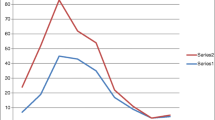Abstract
Aim
This study aimed to explore knowledge and acceptability of prenatal procedures both non-invasive prenatal screening tests and invasive procedures among Egyptian women in childbearing age and to assess their attitude toward such procedures. Also to examine confounding factors affecting women’s attitude toward prenatal procedures.
Study Design
A cross-sectional study on a representative sample of women in childbearing age attending Obstetrics & Gynecology outpatient clinic at Mansoura University Hospital, Egypt. An anonymous questionnaire was supplemented by voluntary interviewers for women in childbearing age.
Results
465 women were included in the study. The mean age ± SD was 27 ± 6 years. About 44 % of women were knowledgeable about non-invasive prenatal screening procedure, and only 25.5 % had heard about invasive prenatal procedures. 88.8 % express positive attitude regarding performance of the screening tests. Forty-one percent of the group agreed to perform invasive prenatal procedures during their pregnancy. Educational level and family history of congenital anomalies significantly affected attitudes toward testing during future pregnancy. The cost of procedure affected the decision to perform in 56.7 % of women.
Conclusion
Egyptian women express positive attitude toward non-invasive prenatal screening but showed poor knowledge. Their attitude toward invasive procedure is guarded by the risk of abortion. Education and family history of fetal anomalies are the factors that affect attitudes. The cost of the prenatal test affects the decision made by the women to participate in testing.
Similar content being viewed by others
References
Rostant K, Steed L, O’Leary P. Survey of the knowledge, attitudes and experiences of Western Australian women in relation to prenatal screening and diagnostic procedures. Aust N Z J Obstet Gynaecol. 2003;43(2):134–8.
Al-Jader LN, Parry-Langdon N, William Smith RJ. Survey of attitudes of pregnant women towards Down syndrome screening. Prenat Diagn. 2000;20:23–9.
ACOG Committee on Practice Bulletins. Screening for fetal chromosomal abnormalities, ACOG Practice Bulletin No. 77. Obstet Gynecol. 2007;217:109–202.
Kitsiou-Tzeli S, Petridou ET, Karagkiouzis T, et al. Knowledge and attitudes towards prenatal diagnostic procedures among pregnant women in Greece. Fetal Diagn Ther. 2010;27(3):149–55.
Dahl K, Kesmodel U, Hvidman L, et al. Informed consent: providing information about prenatal examinations. Acta Obstet Gynecol Scand. 2006;85(12):1420–5.
Stefansdottir V, Skirton H, Jonasson K, et al. Effects of knowledge, education, and experience on acceptance of first trimester screening for chromosomal anomalies. Acta Obstet Gynecol Scand. 2010;89(7):931–8.
Hedayat KM, Shooshtarizadeh P, Raza M. Therapeutic abortion in Islam: contemporary views of Muslim Shiite scholars and effect of recent Iranian legislation. J Med Ethics. 2006;32(11):652–7.
Babay ZA. Attitudes of a high-risk group of pregnant Saudi Arabian women to prenatal screening for chromosomal anomalies. East Mediterr Heal J. 2004;10:4–5.
Dahl K, Kesmodel U, Hvidman L. Informed consent: attitudes, knowledge and information concerning prenatal examinations. Acta Obstet Gynecol Scand. 2006;85(12):1414–9.
Willruth A, Vieten J, Berg C, et al. Decision making and attitudes towards invasive prenatal diagnosis in the early second trimester. Ultraschall Med. 2010;31(5):515–9.
Muhsen K, Na’amnah W, Lesser Y, et al. Determinates of underutilization of amniocentesis among Israeli Arab women. Prenat Diagn. 2010;30(2):138–43.
Brajenovic B, Babic I, Ristic S, et al. Pregnant women’s attitudes toward amniocentesis before receiving Down syndrome screening results. Women’s Health Issues. 2008;18(2):79–84.
Julian-Reynier C, Macquart-Moulin G, Moatti JP, et al. Attitudes of women of childbearing age towards prenatal diagnosis in south eastern France. Prenat Diagn. 1993;13(7):613–27.
Kishk NA. Knowledge, attitudes and practices of women towards antenatal care: rural-urban comparison. J Egypt Public Health Assoc. 2002;77(5–6):479–98.
Benn PA, Kaminsky LM, Ying J, et al. Combined second trimester biochemical and ultrasound screening for Down syndrome. Obstet Gynecol. 2002;100(6):1168–76.
Souka AP, Michalitsi VD, Skentou H, et al. Attitudes of pregnant women regarding termination of pregnancy for fetal abnormality. Prenat Diag. 2010;30(10):977–80.
Jaber L, Dolfin T, Shohat T, et al. Prenatal diagnosis for detecting congenital malformations: acceptance among Israeli Arab Women. IMAJ. 2000;2:346–50.
Author information
Authors and Affiliations
Corresponding author
Rights and permissions
About this article
Cite this article
Shalaby, H.A.R., Elhady, R.A., Gamal, A.M. et al. Prenatal Diagnosis in Low Resource Setting: Is It Acceptable?. J Obstet Gynecol India 62, 515–519 (2012). https://doi.org/10.1007/s13224-012-0185-1
Received:
Accepted:
Published:
Issue Date:
DOI: https://doi.org/10.1007/s13224-012-0185-1




